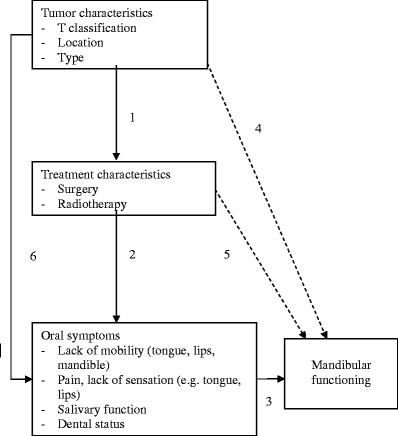Oral symptoms and functional outcome related to oral and oropharyngeal cancer
- PMID: 20706851
- PMCID: PMC3151373
- DOI: 10.1007/s00520-010-0952-4
Oral symptoms and functional outcome related to oral and oropharyngeal cancer
Abstract
Purpose: This study aimed to assess: (1) oral symptoms of patients treated for oral or oropharyngeal cancer; (2) how patients rank the burden of oral symptoms; (3) the impact of the tumor, the treatment, and oral symptoms on functional outcome.
Methods: Eighty-nine patients treated for oral or oropharyngeal cancer were asked about their oral symptoms related to mouth opening, dental status, oral sensory function, tongue mobility, salivary function, and pain. They were asked to rank these oral symptoms according to the degree of burden experienced. The Mandibular Function Impairment Questionnaire (MFIQ) was used to assess functional outcome. In a multivariate linear regression analyses, variables related to MFIQ scores (p≤0.10) were entered as predictors with MFIQ score as the outcome.
Results: Lack of saliva (52%), restricted mouth opening (48%), and restricted tongue mobility (46%) were the most frequently reported oral symptoms. Lack of saliva was most frequently (32%) ranked as the most burdensome oral symptom. For radiated patients, an inability to wear a dental prosthesis, a T3 or T4 stage, and a higher age were predictive of MFIQ scores. For non-radiated patients, a restricted mouth opening, an inability to wear a dental prosthesis, restricted tongue mobility, and surgery of the mandible were predictive of MFIQ scores.
Conclusions: Lack of saliva was not only the most frequently reported oral symptom after treatment for oral or oropharyngeal cancer, but also the most burdensome. Functional outcome is strongly influenced by an inability to wear a dental prosthesis in both radiated and non-radiated patients.
Figures

References
-
- Konstantinovic VS. Quality of life after surgical excision followed by radiotherapy for cancer of the tongue and floor of the mouth: evaluation of 78 patients. J Craniomaxillofac Surg. 1999;27:192–197. - PubMed
MeSH terms
LinkOut - more resources
Full Text Sources
Medical

